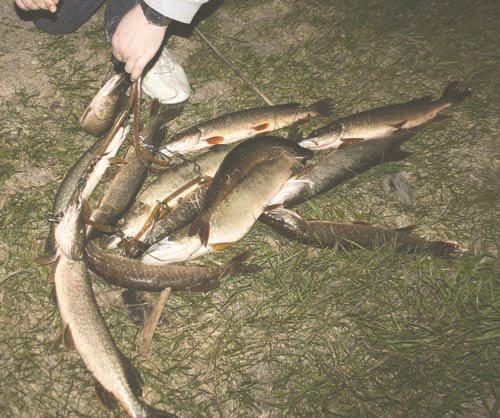Welcome to Week III of 'Shore Fishing the Parkland'. Like most of us I am a novice fisherman, loving to fish, but far from an expert, In the following weeks I'll attempt to give those anglers who love to fish but just don't have access a boat a look at some of the options in the Yorkton area where you can fish from shore, and hopefully catch some fish for a good summer fry.
This week we head west on Highway 16, but don't worry, you won't need a full tank of gas for this one. You get to Springside, and turn north. You'll cross a river, and then take the second road left. There is a big sign on the corner promoting a local business.
You are now heading west again. When you cross the river (it's the Whitesand again) you turn right at the top of the hill on the other side of the river and follow the road to the location of the Theodore Dam.
Theodore Dam was built in 1964 and has a reservoir capacity of 14,802 cubic decametres (it's good sized body of water, at least for the local area), with the dam itself 14.2 metres in height, according to the Saskatchewan Watershed Authority Website.
At the dam itself there are several options for fishing, some requiring descending a rather steep incline to get to the down river side of the dam. It is not a climb everyone will want to attempt.
No worries though, there are ample shore fishing options without turning mountain goat to make the climb.
As you get to the site there is a boat launch, and you can climb carefully over some rocks and find spots which provide good casting. Early in the season, and this year in particular, the pike hit here pretty steady, especially later in the day.
This is one of those locations where you will want to pay a bit of homage to Len Thompson. If you are a fisherman you are at least aware of the name from the line of spoons which bear his name.
For a Saskatchewan fishermen using those spoons should be a matter of pride since Len Thompson, a returned First World War soldier and farmer, developed his first fishing spoon in Abernethy, Saskatchewan, in 1929, and operated Len Thompson Bullet and Bait as a part time, winter business out of his farm until 1945, when he finally headed east to Toronto to create the company that still operates today. Thompson died in 1979, but the company, based in Lacombe, AB. remains.
Which brings us back to the Theodore Dam. This spring my son and I have had good luck with a perch designed spoon, one of the more recent permutations of the Len Thompson spoon in their line. When it has gone cold, the red and white spoon, the most iconic paint job among the company's line have been killer on Theodore pike.
I've also dragged a few in on the familiar red five of diamonds design, and one slow afternoon one struck on a green frog back spoon, a hook I have used little since my days at Tobin Lake, but always make sure I have in the tackle box.
Actually I have a few of most every Len Thompson design to be honest. I usually like to purchase hooks in two sizes, 0 and 00 and usually buy two of anything I add to the box. That is simply insurance that if fish are hammering a certain lure and you happen to lose it to a line break to a fighter, or you hook an unforgiving snag in the water, you have a back-up hook.
But back to the dam site.
There is a road you can follow to get closer to the dam works itself, and there are numerous spots to cast from there, or to throw out a jig and wait.
Yes there are pickerel in the reservoir, although at the dam end they seem a more difficult catch.
Perch are also in the waters, but they are generally not the primary fish species you head to Theodore Dam hoping for.
Now I have seen some big pike come out of the waters, nothing that is going to threaten a record, but huge just the same. Most are not though, and that's all right too because moderate-sized pikes, especially in the cool waters of the early season are fine eating.
Three trips in a row this spring have meant three times limiting out. Once three of us went and managed the trick, and twice two of us made the trek and we did it. That's pretty steady production from the shore at any water body.
Definitely a spot to mark on your fishing map.




